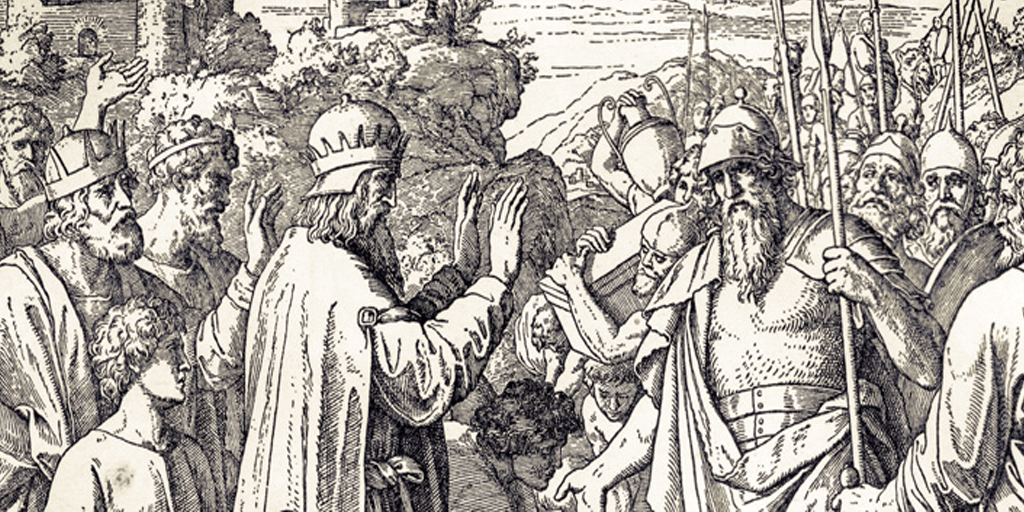Who Was Melchizedek?

Who Was Melchizedek?
In the Bible, Melchizedek is a mysterious figure. He is only mentioned twice in the Old Testament (Genesis 14:18-20 and Psalm 110:4) and in one section of the New Testament (Hebrews 5-7).
His appearance in Genesis 14 interrupts the main storyline concerning Abram and the king of Sodom, and leaves the reader with all kinds of questions: From whom did Melchizedek descend? How does he know Abram’s God Most High? Did he have any decedents who continue serving as God’s royal priests?
Furthermore, the mention of Melchizedek in Psalm 110 appears abrupt as well. One is left wondering: Why this brief interjection about a priest in verse 4 when the rest of psalm focuses on His conquest as King?
It is not until we come to the book of Hebrews that we realize how Melchizedek’s enigmatic portrayal foreshadows Christ’s origin and office. Let’s examine some of the main themes surrounding the identity of Melchizedek and his relation to Christ.
Fast Facts on Who Was Melchizedek
Melchizedek is the King of Righteousness and Peace.
His name is comprised of two words: melech meaning “king” and zedek meaning “righteousness.” Furthermore, Salem, the city over which he is king, means “peace.” Thus, he is by name “the King of Righteousness” and by location “the King of Peace” (Hebrews 7:2).
Melchizedek likely ruled over Jerusalem during Abraham’s day.
This can be derived from the fact that Jerusalem is sometimes referred to as Salem (Psalm 76:2). Moreover, Genesis 14:17 locates his appearance in the “the King’s Valley” (also known as the Kidron Valley) which lies between the city of Jerusalem and the Mount of Olives.
Melchizedek is both a king and a priest of God Most High.
Throughout the Old Testament, Israel’s kings and priests came from distinct linages and fulfilled distinct roles. In Psalm 110, David hears God declare that his decedent would be both a king and priest, like Melchizedek in Abraham’s day. He would not be a Levitical priest, but rather “a priest … in the order of Melchizedek” (Psalm 110:4).[1] Other passages in the Old Testament, like Zechariah 6:12-13, continue this theme of the Messiah uniting the roles of a king and a priest.
Melchizedek is superior to Abraham and David with an origin beyond their lineage.
Abraham, who is God’s promised source of blessing to the nations (Genesis 12:2-3; 18:18), was himself blessed by Melchizedek who was outside his promised line. Abraham regarded him as his superior. Hebrews notes, “[Melchizedek] blessed him who had the promises. And without doubt the lesser is blessed by the greater” (Hebrews 7:6-7).
David surprisingly treats his own decedent (who is declared to be a priest in the order of Melchizedek) as his superior by calling Him “Lord” (Psalm 110:1). Years later in a dialogue with the Pharisees, Jesus brings up this passage and notes how it can only make sense as an allusion to His divine origin (Matthew 22:41-46; Mark 12:35-37). Thus, God’s reference to the order of Melchizedek in Psalm 110:4 develops the psalm’s emphasis on the Messiah’s superior origin which extends beyond His human lineage.
Melchizedek’s human lineage is left purposefully ambiguous to clarify Jesus’ divine origin and unique appointment.
This argument is established in Hebrews 7.
Melchizedek’s human descent is purposefully omitted to foreshadow Christ’s divine origin (Hebrews 7:3). This argument (based on the silence of Genesis 14) is supported by the fact that Genesis strikingly provides a genealogy for every major figure except Melchizedek.
Jesus became a priest in the order of Melchizedek based on God’s declaration, not ancestry (Hebrews 7:16-17). This explains how Jesus can be a priest even though He is from the non-priestly line of Judah (Hebrews 7:13-14). Furthermore, generational replenishment is unnecessary since the office is held forever (Hebrews 7:23-24).
Although the Bible corresponds Melchizedek with Jesus, it never equates the two.
It consistently uses language that distinguishes them as separate individuals. Below are some examples.
– Jesus is declared “a priest in the order of Melchizedek” (Psalm 110:4). If we are to view them as the same, why not say, “You are Melchizedek, My priest”?
– Hebrews describes Melchizedek as merely “resembling the Son of God” (Hebrews 7:3). If we are to equate these individuals, why does it not directly call him “the Son of God”? Why does the author go out of his way to maintain their distinction?[2]
– Hebrews even refers to Jesus as “another priest like Melchizedek” (Hebrews 7:15). Again, the author intentionally phrases this to preserve their distinction.
So who was Melchizedek? It is best to speak of Melchizedek as a historical human who foreshadows Christ and not a pre-incarnate appearance of Jesus Himself. Through Melchizedek, God provides us with a pattern to better understand who Jesus is and how He relates to God’s promises. Melchizedek’s enigmatic origin yet superior status and office foreshadow how Jesus would come not only from the line of Abraham and David but also as God Himself to establish righteousness and peace as our eternal Priest and King.
A few other interesting facts:
Melchizedek is the first person in the Bible to be called a priest and appears in the first chapter which mentions kings. Although these functions are present from the time of Adam, it is interesting that the titles do not occur until Genesis 14 where Melchizedek is labeled as both.
Psalm 110 (which mentions Melchizedek in v. 4) is quoted in the New Testament more than any other chapter from the Old Testament.
The mention of Melchizedek bringing out bread and wine is one of the few details about him that is never drawn out in Scripture and corresponded with Christ.
Go Deeper
[1] All quotations of Scripture are taken from the NIV.
[2] The mention in Hebrews 7:3 of Melchizedek being “without father or mother, without genealogy, without beginning of days or end of life” is most likely based on the surprising absence of these details concerning his portrayal in Genesis 14. It seems God has purposefully inspired Melchizedek to be depicted in this way so that he would “resemble” and thus foreshadow Christ. It is not that Melchizedek was historically “without beginning of days,” but merely portrayed in this way through silence. This reading finds support from the Jewish interpretive principle: “If it is not written in the Torah, it does not exist in the world.” Even if one prefers to understand this detail as a historical reality and not merely a literary portrayal, the repeated distinction between Melchizedek and Christ still remains.
________________________________________
1. All quotations of Scripture are taken from the NIV.
2. The mention in Hebrews 7:3 of Melchizedek being “without father or mother, without genealogy, without beginning of days or end of life” is most likely based on the surprising absence of these details concerning his portrayal in Genesis 14. It seems Hebrews even refers to Jesus as “another priest like Melchizedek” (Hebrews 7:15). Again, the author intentionally phrases this to preserve their distinction.
3. God has purposefully inspired Melchizedek to be depicted in this way so that he would “resemble” and thus foreshadow Christ. It is not that Melchizedek was historically “without beginning of days,” but merely portrayed in this way through silence. This reading finds support from the Jewish interpretive principle: “If it is not written in the Torah, it does not exist in the world.” Even if one prefers to understand this detail as a historical reality and not merely a literary portrayal, the repeated distinction between Melchizedek and Christ still remains.








